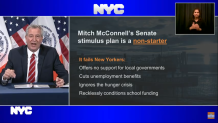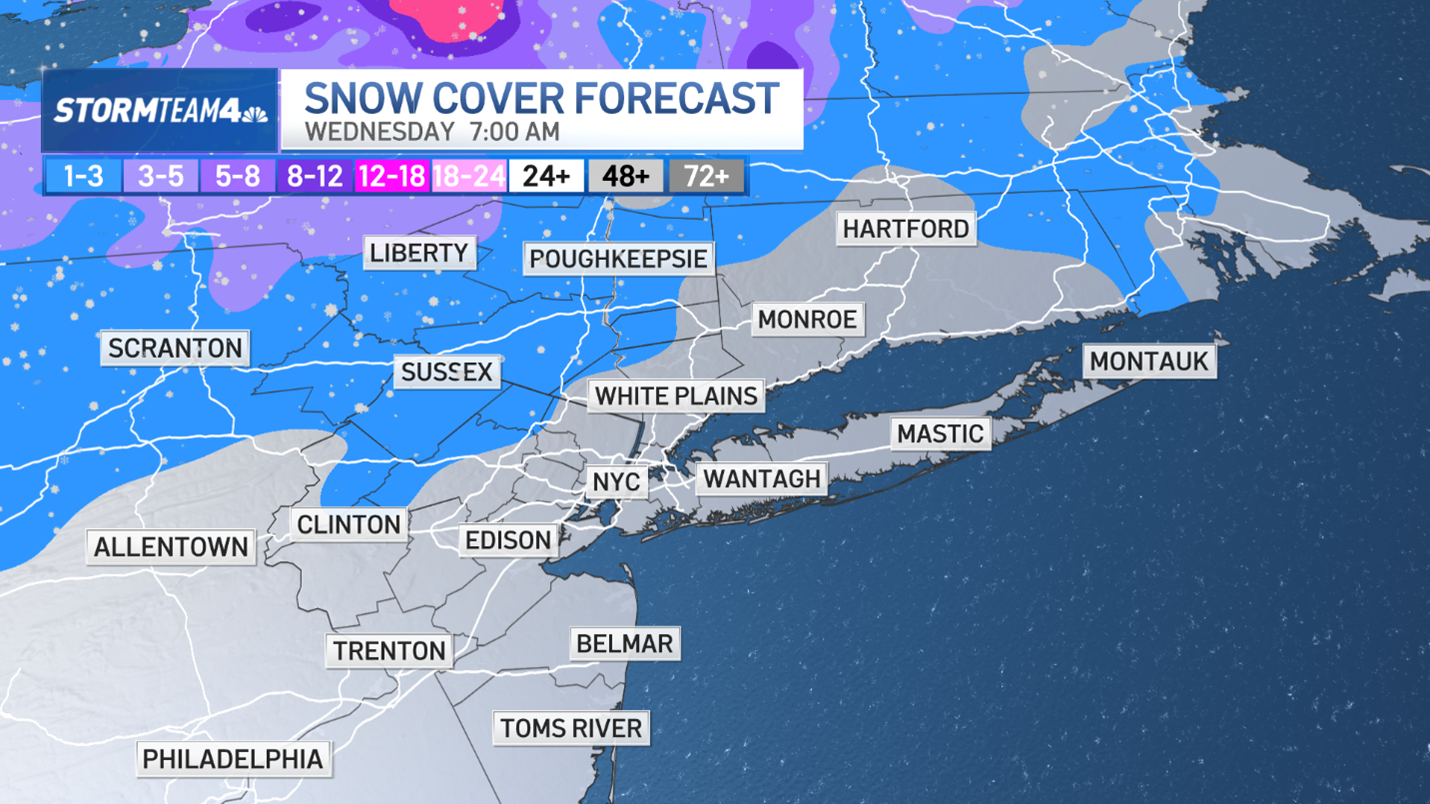Tri-state leaders slammed the long-awaited stimulus package proposed by Republicans in the Senate with Mayor Bill de Blasio saying it "just doesn't work," calling it a "non-starter" during his Tuesday coronavirus press briefing, while Gov. Andrew Cuomo said the proposal, if passed, will have a "dramatic" impact on New Yorkers.
"The Republicans in the United States Senate presented their version of a stimulus plan but I have to say to Majority Leader [Mitch] McConnell, not much of a stimulus there," de Blasio said. "In fact, I would call it a non-starter. This plan literally provides zero support for state and local government that are fighting through this crisis, that are struggling just to keep basic services going to provide the health support people need to make sure that our first responders and our health care heroes will still have their jobs to keep serving us."
Cuomo said the ramifications if the bill is passed will be felt by New Yorkers. Cuomo described that New Yorkers could see an increase in property taxes, school and hospital aid slashed by 20 percent, an increase in LIRR, MTA and toll fares, and that the Port Authority could be forced to slow or stop construction at LaGuardia and JFK airports if the federal government does not provide state and local funding.
"Funding has to come from somewhere," Cuomo said: "There is nothing conceptual or abstract about this exercise. It is going to have a dramatic practical effect on New Yorkers and I want New Yorkers to know the consequences because I want our federal representatives held accountable."
"I just wish the consequences weren't so high," the governor went on to say.
MTA Chairman and CEO Patrick Foye also commented on the proposed HEALS Act, calling it "shameful."
"The HEALS Act put forward by the U.S. Senate is shameful. This backwards bill will only further devastate our country and economy with no dedicated funding for mass transit – the circulatory system of the nation – and no new support for state and local governments. The MTA in New York is suffering a once-in-100-year fiscal tsunami as a result of the COVID-19 crisis’ impact on ridership and non-fare revenues. We need an injection of $3.9 billion in additional emergency federal funding just to keep the lights on this year," Foye's statement reads in part.
News
Foye went on to say: “Without federal relief, the MTA will have no other choice but to make drastic service reductions, pandemic-related fare and toll increases, job cuts, or gut our historic capital plan. None of this can be allowed to happen – we can’t afford to turn the clock back to the bad old days of the 1970s. If the federal government fails to act, this pandemic will end up on the backs of riders and stymie not just New York’s economic rebound, but the nation’s as well. Washington: don’t let it happen.”
Senate Majority Leader Mitch McConnell (R-Ky.) announced the Health, Economic Assistance, Liability Protection and Schools, or HEALS, Act Monday night, the upper chamber’s long-awaited coronavirus stimulus package. The $1 trillion bill includes an extra $200 per week in unemployment insurance, down from $600 in the earlier CARES Act, and more money for schools, among other measures.
The Republicans come to the negotiating table hobbled by infighting and delays. McConnell said he wanted to hit “pause” on new spending after Congress approved a sweeping $2.2 trillion relief package in March. But House Speaker Nancy Pelosi, D-Calif., took the opposite approach, swiftly passing a $3 trillion effort with robust Democratic support. In the intervening months, the crisis deepened.

McConnell, flanked by top GOP chairs Monday at the Capitol, unveiled his long-awaited proposal. It provides some $105 billion to schools and colleges, the K-12 funds tilted toward campuses that reopen with in-person learning. There's more money for virus testing, $15 billion for child care centers and benefits for businesses, including a fresh round of loans under the Paycheck Protection Program, tax breaks and a sweeping liability shield from COVID-19-related lawsuits.
Republicans left out new money for cash-strapped states and cities, a priority for Democrats, but included another round of $1,200 direct payments to households that Democrats also support. The second round of checks will follow the same eligibility formula as the first round, according to a memo from the Senate Finance Committee.
Individuals will also receive $500 for each dependent, just like under the CARES Act. Unlike the first time around, though, there is no age cap on the extra payment. The CARES Act capped the dependent payment at age 17, excluding many college students and other adult dependents from receiving a check.
The GOP bill also provides $1.7 billion for a new FBI headquarters in Washington, a non-pandemic-related expense that's a top priority for the president but not for lawmakers or McConnell.
While Senate Republicans struggled to roll out their own $1 trillion proposal, Pelosi implored the White House and GOP lawmakers to stop the infighting and come to the negotiating table with Democrats. Aid runs out Friday for a $600/weekly jobless benefit that Democrats call a lifeline for out-of-work Americans. Republicans want to slash it to $200 a week, saying that the federal bump is too generous on top of state benefits and is discouraging employees from returning to work.
Democrats will likely look to change some provisions. Senate Minority Leader Chuck Schumer (D-N.Y.) and Pelosi said the bill falls short of what is needed to help with the coronavirus recession, because it does not include hazard pay for essential workers, does not adequately address the eviction crisis and does not provide additional funding for food stamps, among other issues.
De Blasio also took notice that the upper-chamber's stimulus package slashes the jobless benefit and does not address the hunger crisis.
"This stimulus plan from the Republicans slashes unemployment benefits at a point when people need them more than ever. It ignores entirely the extent of the hunger crisis. We know right now in the city, almost 2 million New Yorkers need food at some point or another in the week and we are providing food for free to all New Yorkers who need it," the mayor said, adding that 100 million meals have been served so far for free to New Yorkers during the crisis.
"The Republican Senate plan just doesn’t work," de Blasio went on to say. "And it certainly fails places that have been hit hardest by the coronavirus like New York City. This plan will not work. It is a non-starter. It literally misses the opportunity to help us fight back, fight this disease, restart our economy. This plan will not help us do that and we have to see something much better... We need to fight for a much better, much clearer stimulus."
Meanwhile, Cuomo said the plan was "pure politics" designed to give flexibility to Republican states on how to spend money previously allocated for the fight against COVID-19.
"What it really does is give more flexibility to some of the states to old money that was previously appropriated that does ny no benefit bc we don’t need flexibility on money unspent," Cuomo said. "We don’t have money unspent. We need additional funding. This is designed to help the Republican states that got funding for COVID in the previous bills who can’t spend the money because they don’t have the number of COVID cases. 'Why were they then appropriated the money?' is a good question. This is pure politics."
He went on to say that in order to kickstart the economy, the federal government needs to help.
For his part, New Jersey Gov. Phil Murphy also touched upon the need for the federal government to provide state and local aid while announcing an additional $15 million in the initial Coronavirus Aid, Relief, and Economic Security (CARES) Act funding that has been made available to New Jersey small businesses struggling with the pandemic.
"This is another reason why we need more federal cash and federal assistance," Murphy said. "Not only will we keep front line workers employed like firefighters, police, EMS, educators, health care workers, but we’ll be able to have more latitude and drive more money to the small business community which we desperately need to continue to do."


